- Home
- Adam Thorpe
Pieces of Light Page 19
Pieces of Light Read online
Page 19
Pungent smell of wood garlic, no doubt about it. Rich and vegetative and profound, like nothing else, not even much like French cooking. Have confirmed in flower book here just now in the hotel lounge that wood garlic or ‘ramsons’ (Allium ursinum) is over and done with by July, like the bluebell. (Aunt Joy always called them ‘ransoms’, I remember.) The smell was in a sort of invisible cloud which after a few minutes had passed away. I walked back and forth along the ferny edge in the rain but there was nothing.
Went back for a spirit-summoning Scotch in hotel bar and Jessica came up very excited with Duckett’s book, Ulverton and Her Ghosts. Crudely drawn illustrations of ghostly shepherds with lamps, big black dogs, skeletal shadows, etc. However, the passage on Ilythia and the Red Lady so shook me that I ordered a double. Here it is.
Further up the lane, past the old apple orchard, is a large, rather gloomy house, long empty, once the home of the well-known author and mystic, Edward Arnold. I remember him as an eccentric old man, sporting in all weathers an old tweed smoking jacket and a bamboo-handled umbrella – which would stay rolled even in rain! He died in 1965, and was survived for several years by his much-younger widow, a recluse in chronic ill-health. I believe the property has now passed into the hands of Arnold’s nephew, the theatre personality Hugh Arkwright [sic]. The house is called ‘Ilythia’, the nameplate still legible on the gate.
An empty house is as inviting for ghosts as it is for wasps, as we have already seen. But ‘Ilythia’ – the name of an obscure Greek goddess, in charge of child bearing – is certainly haunted, and was so long before the shutters went up [shutters?]. Apart from the odd but unconfirmed sighting of lights burning in the windows at strange hours, several people have seen a ghostly lady walking in the grounds – but only, apparently, in snowy weather. In each case, immediate investigation has shown no footprints. She is dressed in a red coat, with black hair, and has the peculiar quality, for a ghost, of having a dark skin. Both Miss Eva Oadam and Mr Frank Petty maintained that her skin was tanned, as if she had been sun-bathing. The late Miss Eva Oadam saw a bright-red coat gliding over the lawn on a snowy day in the early 1970s, though she also saw an accompanying pair of bloomers and three hovering brassières – I am tempted to conclude that a washing-line might have played a role! Mr Frank Petty’s report is more interesting: in his own words – ‘I was delivering coal to the late Mrs R.S. Arnold, when I looked up from the bunker, where I had just emptied my sack. I saw a woman – certainly not Mrs R.S. Arnold – walking across the lawn. She was at some little distance from me, and it occurred to me then that she might be the so-called Red Lady. I didn’t feel frightened, but unfortunately the coal dust made me cough, and she vanished, as if I’d startled her. She must have the hearing of a deer! She’d been walking towards the wood at the bottom of the garden, across thick snow. The snow was undisturbed, however: the only prints on the lawn that I could see were those of birds. I didn’t talk about it to Mrs Arnold, for fear of causing her alarm, as she was of a nervous disposition.’
Another witness, Mrs Enid Bradman, saw a red-coated lady walking down Crab-Apple Lane during snowy weather, probably in 1982, but cannot recall whether it was in the vicinity of the Arnold house or nearer the village centre. She was already aware of the previous sightings.
Mrs Grace Hobbs (who runs our general stores), says that she believes the ghost to be that of Mr Arnold’s first wife [sic], who died at the same time as Mrs Hobbs’s sighting, which took place in the early Thirties. The first Mrs Arnold spent much of her time in Africa, which might account for the tanned skin; she eventually died out there in mysterious circumstances, many thousands of miles from her home. However, there are various anomalies in this case. First, Mrs Hobbs saw the ghost, not by the house but in the snow-covered lane, gliding swiftly towards the gate. Secondly, it is usually someone very close to the deceased, and not a bare acquaintance, who receives a vision of the person at the moment of his or her death. Thirdly, the ghost in such a case does not usually return.
I have not been able to track down any other witnesses . . .
He then ‘field-tests’ the snow theory himself, crouching behind a bush on the lawn, but is merely troubled by cold and the whining of his dog. Of course the dog has to whine.
Jessica tells me that Enid Bradman died last year after being pushed over by a mugger, and was full of tales. But what a nice woman – she saved the old barn from being demolished, for a start. Mugger never caught, but they think it was someone local. She trod on so many toes. That’s one thing I won’t be doing, I said. Mugging, or treading on toes, Hugh? I do like Jessica, I really do. Maybe Enid Bradman’s something to do with Herbert Bradman. Nuncle was very keen on him – almost as dotty, as far as I recall.
Anyway, I need to see Gracie again. I’m sitting here at the sloping desk with my heart flaring and my forehead sweaty like a frightened, excited little boy.
I need to ask her about the redness of the Red Lady. Whether it was close to vermilion. Whether it would clash with the hibiscus, as it were.
Jessica wondered when I would be staying to and I confessed that I was moving to the Green Man next week. She seemed relieved not sad – there’s a big party of geologists coming and it looks as if they’re under-booked, so I’ve had to hurry Ted up.
Went into the Green Man to see Ted and again Mr Muck and John Wall were there. I don’t know how but the tale of Jack Wall’s demise came up. Muck whispered to me conspiratorially while John Wall grinned inanely yet with cunning in his eyes that arsenic had been found on Mrs Maddy Villiers’s fingers and that she’d actually been arrested! Released for lack of evidence, apparently. One can see why this was left out by Malcolm but then what else was left out?
Muck was a bit past it on barley wine, drawly accent even drawlier, but I did mention his ‘sighting’. He said it would cost me a glass of same to know more. I relented, of course. He then gave me an idiolectal version of his appearance in Ray Duckett’s book, but with no extra facts. I thanked him. There was a pause, and he said, leering at me: ‘Oh yes, we have some fond memories of young Mrs Arnold, don’t us, John?’ John nodded, beaming. ‘I expects you do, too, Mr Arkwright,’ the coalman added. There was something so horrible about his look, the way he eyed me then, that I felt physically sickened and had to bid them a hasty goodnight. I find their company more irritating than picturesque and will be coldly polite from now on. No reason why John Wall shouldn’t continue doing his bit for me, however.
Saturday, 2 October
Rehearsal in the village hall, still a corrugated tin shed lined warmly inside with waxy wood, but painted green, not brown. Spare the details of the pudding of a ritual drama that Malcolm’s struggling to produce, except that he’s throwing in dollops (or wallops) of a Sword Play, a Wooing Play, and a Hero-Combat Play and stirring hard. Mrs Pratt (apparently with two ts) introduced me as ‘terribly famous’, and everyone (including me) chortled with embarrassment. Felt so sorry for Malcolm as the débĉacle proceeded that I invited him to dinner at the Old Barn.
We talked theatre history, over the candles. Or theatre prehistory: hobby-horses rooted in centaurs, mumming in fertility rituals, all that misty-moor stuff. He mentioned that in Nuncle’s Harmonies of the Primitive there’s a photo of the Ulverton mumming troupe and the hobby-horse has a leopard skin draped on it. This is apparently because the Babylonian centaur was always depicted on vases and so forth with a leopard skin and wings. Uncle Edward dispensed with the wings, I said, because wings have a habit of falling off.
Malcolm didn’t smile over his vegetarian quiche. He wants to resurrect the leopard-skin practice. I didn’t say anything about my find in the attic – even though it must be the same skin. Instead I told him that this was a falsely exotic touch by my uncle, that no real mummers’ troupe in this country would ever have sported such a thing. I also repeated my assertion that most of what Edward Arnold wrote was second-hand tripe. He asked me over the pudding why I hated my uncle so much, just as Morris had aske
d me once. I gave a flustery sort of non-answer and we ended up talking about something else – music, I think. He teaches music and a bit of drama in various primary schools but with no great enthusiasm. He whinged on about everyone believing teachers are lazy whingers and I stopped myself making the obvious comment. A middlebrow touched with leftish views, which makes him think he’s radical: Mozart less ‘relevant’ than a rap song, Shakespeare an old dud, kids better off with a triangle and a couple of tom-toms than a violin. I’m amazed he talks to me at all.
Sunday, 3 October
Mother’s birthday. The day before the Feast Day of St Francis, we were reminded by Eddie the Vicar. A great number of little birds in the air but not much song yet. She’d have been easily still alive, not yet a hundred, a dear withered old thing with twinkly eyes. I wish there were candles to light in parish churches (but anyway they’re mostly locked). I did offer up a prayer in Holy Communion, and relished the taste of the wine. Perhaps it isn’t just wine. The arguments about this remind me of the arguments about the actor and his part. Passion is not less passionate for being feigned. One can be both possessed and in possession, both the mask and the face behind. The wine can be both plonk and blood.
Joined the coffee and biscuits afterwards in order to corner Gracie but was cornered in turn by Eddie, clearly thrilled by my zeal. I almost found myself in charge of hymn-books for the next few years, or something, but at least he introduced me to a snorty, snuffly little man called Mr Quallington – the parish clerk. Mr Q said he was terribly busy but at some point we could ‘go through’ the old sextonian documents for the whereabouts of the two plots. He made it out to be the greatest of chores. An ex-schoolmaster, is my guess. Gracie gave me the slip.
Afterwards I felt a sort of ancestral loneliness, unrelieved by walking (grisly grey weather, mashed-up leaves everywhere) or by reading. If I’d had children, then I would still have them, however ghastly or unsympathetic they’d turned out to be. Like Tom Everett’s daughters. Walking the Heath with someone calling you Daddy, gentle remonstrances, arm in yours, leaning on you at least.
Should I let a girlfriend happen? Someone of Jessica’s strength and maturity and jolly smile, easy ways, straightforward beauty? There are women who like old and difficult men who are gifted, have power. Play the sage.
But then I would be spoiling whoever I plucked, a ghastly parody of my one and only love. The old goat who spoiled it now played by me, buffoonishly. Can memory – a memory – be blighted in the same way? I have expended so much energy on dividing those golden memories of her from the Fall, and it has worked so far. She is two different people, and now she is dead anyway. Long dead. Her beauty can hang intact in my head and along my arms while her blighted second self can be decently buried.
Old goat? He was only in his early forties, then. My mother was not even that, she was thirty-nine when she left us. If she left us. This still seems old, because even to my boy’s eye she seemed physically younger, almost like a young girl, with the smooth skin of a young girl. Might have been to do with the soft, humid air of the out-station. She had shadows under her eyes and a thinness – but that was fever, that was Africa.
Watching a mother and her son over lunch today at the Mill. She rotund and wobbly, big laugh, probably has enormous house and dogs; he about ten, assured, probably at boarding prep, perhaps his birthday, but blue around the eyes and wearing a baseball cap over what looked like baldness. Maybe mortally ill.
I’m reminded by the childhood memoir how Mother never looked at me properly. This must have been because she knew she was going to lose me to England. Easier for both of us: buckling down her maternal instinct as cargo was buckled down in the steamer’s hold. She wasn’t the reserved type, otherwise. Jigging about to all those records. Laughing with the men at the Club in Victoria. Kissing Father.
But if England had been replaced by Death, she might have looked at me as the mother in the restaurant kept looking at her son. I did nearly die, of course, that time – that winter of snow. And that was the time she disappeared.
Good God.
I don’t believe in ghosts. No I don’t.
Later. Very pleased to be here, in Ted’s attic room, out of the hotel and into something I can call my own domain. He has found me an old table, an old round pub-table he removed years ago because it had accumulated obscene graffiti. He thought I wouldn’t mind and I don’t. There were obscene scribbles in Pompeii. He brought up the ‘lamp’ very proudly and it was one of those glass columns full of tumescent fluorescent ectoplasm that make me feel sick. And far too dim. Perhaps he thinks I have ultra-violet sight under my eye-patch (or knows I was an observer in the war). I thanked him, anyway.
The room smells of bleach, nicotine and underarms beneath the beer because Ted’s cleaning lady has only just done it. Ted is pleased to see me installed, but is nervous about breakfast, I can see that. Joe the Gelatine Was Here pencilled next to the door: the whole place, even the rooms below, occupied by a film crew shooting a documentary a few years back that I never even noticed. He said they drank him dry, sounding nostalgic. Not my thing, I’m afraid, I said.
Have made enquiries about Ray Duckett: he is installed in the Hazeldell Rest Home just south of Netherford. Am in no hurry. If I hurry I will screw things up.
Screw what up?
My investigation into the mystery of the Red Lady, of course. Good grief, sounds like something Wilkie Collins might have put on in his drawing-room, for the delectation of the ladies. Or Now Showing at the Criterion Theatre. Six-foot letters in red on a black background, all over London: THE RED LADY MYSTERY. To what have I descended?
Anyway, I look upon this room as the show’s headquarters. Its sloping ceiling reminds me that it is an attic and I feel nicely high up. There is another attic less than a mile away and perhaps that holds a clue of some sort. There are suitcases and boxes and the big bamboo-ribbed trunk and piles of papers, mostly newspapers, and African souvenirs. So far I have found nothing.
But archaeology, I remember Keiller saying, is 99 per cent mud and boredom and wet winds up one’s back. Much like theatre.
Feel I am sitting here piloting a craft that is pitted against the great lump of the other thing, that if I tear open that lump I will find what I am looking for. Quite seriously, dear diary. But I can’t set it down yet. Not in so many words. I do have a few grains of superstition left.
Monday, 4 October
Wrote postcards this morning: there is only one of Ulverton – the main street with lots of Ford Cortinas and women in dumpy coats and head-scarves. One of the coats is bright red, of course.
Went straight to the house after lunch, straight up to the attic, and then couldn’t bend over for indigestion. First things first, and first things are in there. I have of course made inroads but now I am more alert because more convinced. Found a pile of Mother’s warped gramophone records, mostly jazz, mostly cracked or broken in their paper sleeves. That might be a clue. I don’t know. I’m no detective. My heart is my magnifying glass: I thought of that while up there, coughing on the dust.
Finally cleared a path to the big trunk. On the way I found the fetish box, the one that looks like a stool or a drum. Father bought it off some trader. Said to contain many powerful fetishes. A lid but jammed tight, cloaked in cobwebs. Pandora’s Box, Mother called it.
The trunk had an Elder Dempster label on it with a picture of the steamer behind some palm trees and on the label was not only our name but a very faint date in ink: December 21st, 1933. I nearly passed away, of course.
This is the most likely date for Mother’s disappearance, around the solstice. Midwinter in England. Sap right down. Hardly any light. The blurred stamp over the date was of the port authorities, perhaps in Victoria. When I was a boy here I was forbidden to go up to the attic, as I was forbidden to go into the wildwood. The truth seems to be dropping into my hands. The trunk was locked. Horribly, thoughts of Ginevra entered my head. Climbed for a joke into a trunk on her weddin
g day and years later, when it was opened, was found as a skeleton in her wedding dress. Ginevra! Ginevra! Ginevra! the bridegroom had called, running up and down the corridors. Now he too was long dead.
There was a creak behind me and to my horror my torch-beam found John Wall’s head. I thought for a moment it had sort of rolled there – that it was just resting there after decapitation. So pasty. Then a sheepish smile broke across it. The rest of him emerged from the trap-door while I controlled my annoyance and made some joke about the junk. On clambering back I tripped over the leopard skin and its big skull flopped into view, snarling at us both.
He was most impressed and offered to clean the thing for me, then carried it down on his back. For all his weedy appearance, he did this without apparent effort, the big furred head bumping on his greasy hair. Laid out on the kitchen table it looked rather fine, for all its dirtiness and moth holes. Most of the claws are intact, as are all the teeth in the upper jaw. No lower jaw, being originally a ritual costume in its untanned life. Whiskers mostly bent or broken, alas, which would have upset Father.
He insisted its use was never sinister, never for murderous practices in a leopard society, but how could he have been sure? Still loath to touch the fur, even though musty and cobwebbed now.
John Wall took it home to clean it – he has cleaned many skins. No doubt.
I left the label where it was. I’ll only lose it to the cleaning woman here. How shall I open the trunk without a key? Force seems wrong. Bad throat from the dust. I need a brandy and Jessica’s ordinary cheeriness.
Tuesday, 5 October
Awful dream: entering some sort of warehouse or church and stumbling on Nuncle with a butcher’s knife, pleaching some complicated basket out of human flesh. I pretended I hadn’t noticed, I was so terrified. Woke up with the sweating realisation that not only do I own the rights to his forgotten works, but that I have never more than dipped into them – as one might dip into the limus niger of the Styx, I suppose. Certain early passages have stuck only because I had to endure their interminable repetition on those wireless-less evenings of my youth.

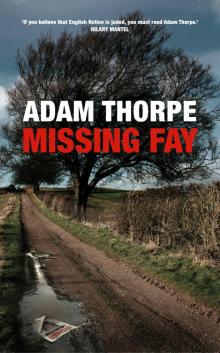 Missing Fay
Missing Fay Hodd
Hodd Pieces of Light
Pieces of Light The Standing Pool
The Standing Pool Ulverton
Ulverton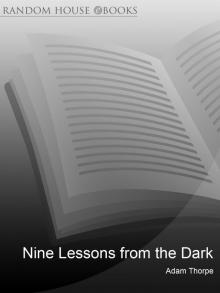 Nine Lessons From the Dark
Nine Lessons From the Dark Flight
Flight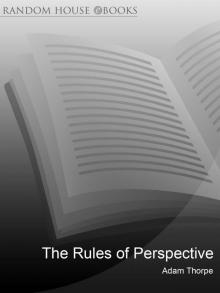 The Rules of Perspective
The Rules of Perspective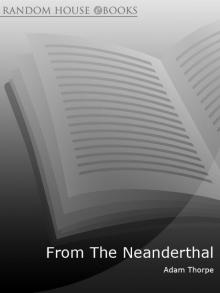 From the Neanderthal
From the Neanderthal Is This the Way You Said?
Is This the Way You Said? Still
Still No Telling
No Telling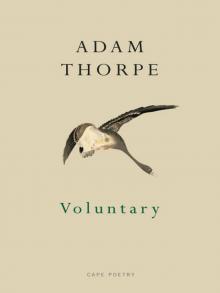 Voluntary
Voluntary Between Each Breath
Between Each Breath